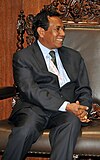East Timorese parliamentary election, 2012
|
|
|||||||||||||||||||||||||||||||||||||||||||||||||||||||||||||||||
|---|---|---|---|---|---|---|---|---|---|---|---|---|---|---|---|---|---|---|---|---|---|---|---|---|---|---|---|---|---|---|---|---|---|---|---|---|---|---|---|---|---|---|---|---|---|---|---|---|---|---|---|---|---|---|---|---|---|---|---|---|---|---|---|---|---|
|
|||||||||||||||||||||||||||||||||||||||||||||||||||||||||||||||||
|
All 65 seats to the National Parliament of East Timor 33 seats needed for a majority |
|||||||||||||||||||||||||||||||||||||||||||||||||||||||||||||||||
|
|||||||||||||||||||||||||||||||||||||||||||||||||||||||||||||||||
|
|||||||||||||||||||||||||||||||||||||||||||||||||||||||||||||||||
Parliamentary elections were held in East Timor on 7 July 2012. The United Nations stated that it would withdraw its 1,300 troops if the elections passed off peacefully. The National Congress for Timorese Reconstruction, led by Prime Minister Xanana Gusmão, won the election with 30 seats, three seats short of a majority in National Parliament.
All 65 members of the National Parliament were elected from a single nationwide constituency by party-list proportional representation voting. A party had to cross the electoral threshold of 3% to enter parliament and seats were distributed according to the d'Hondt method. Parties were required to submit lists with 65 candidates and at least 25 replacements. According to the electoral law, every fourth member on a party's list has to be a woman.
In total, 21 political parties registered for the election. The campaign was focused on economic issues, particularly the country's $10.5 billion oil fund. Alongside the two main parties, CNRT and FRETILIN, a further 19 parties and lists registered for the elections.
The election campaign was focussed on economic issues, particularly the question of what should be done with the country's oil fund, worth $10.5 billion. The CNRT campaign pledged to increase the amount of money the fund contributed to the state budget beyond the existing 3% limit and to attract foreign loans for infrastructure improvement projects, promising long-term investment in roads and electricity and water supplies. FRETILIN opposed CNRT's policies on foreign loans and changes to the oil fund spending, but ran a campaign focused on raising levels of income and education. FRETILIN general secretary Mari Alkatiri promised to reduce corruption if elected.
...
Wikipedia




